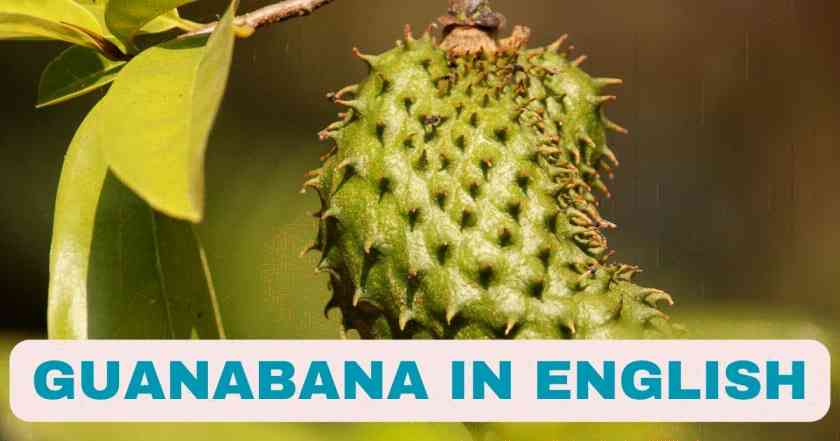Guanabana in English
- The name of Guanabana in English is Soursop
Guanabana Fruit
Guanabana, also known as soursop or graviola, is a tropical fruit native to the Americas. It grows on the evergreen tree Annona muricata, which can reach up to 10 meters in height and is characterized by its large, dark green, spiny fruit. The fruit has a sweet and tangy flavor, and is used in a variety of culinary and medicinal applications.
The guanabana fruit is a good source of several important nutrients, including vitamin C, vitamin B6, and potassium. It also contains small amounts of other vitamins and minerals, as well as dietary fiber. Additionally, the fruit is high in antioxidants, which are compounds that help protect the body against damage from harmful molecules known as free radicals.
Guanabana has been used for centuries in traditional medicine to treat a range of health conditions, including infections, inflammation, and digestive issues. Some preliminary research suggests that certain compounds found in guanabana may have anti-cancer properties, though more research is needed to fully understand the potential health benefits of the fruit.
Despite its potential health benefits, guanabana is not without its risks. The seeds and leaves of the guanabana tree contain a toxic compound called annonacin, which has been linked to neurological damage and movement disorders in some people. As a result, it is important to consume guanabana in moderation and to avoid consuming the seeds or leaves of the fruit.
In terms of culinary applications, guanabana is a versatile fruit that can be used in a variety of dishes. The fruit can be eaten raw, though its spiky exterior can make it difficult to handle. It is also commonly used to make juices, smoothies, and ice cream. In some cultures, the leaves of the guanabana tree are used to make tea, which is said to have a calming effect
In addition to its culinary and medicinal uses, Guanabana has also been used in the production of natural pesticides and insecticides. Extracts from the fruit and leaves have been shown to have insecticidal properties, making them a potentially useful alternative to synthetic pesticides that can be harmful to the environment.
In terms of its cultivation, guanabana is a tropical fruit that thrives in warm, humid climates. The fruit is typically harvested when it is fully ripe and ready to eat, though it can also be harvested earlier for use in medicinal applications or for the production of natural insecticides.
History of Guanabana Fruit
The history of guanabana dates back thousands of years to the tropical regions of Central and South America, where it was first cultivated by indigenous peoples. The fruit was highly valued for its sweet and tangy flavor, as well as its potential medicinal properties.
Guanabana was likely first domesticated by the Arawak and Taíno peoples of the Caribbean, who used the fruit in a variety of culinary and medicinal applications. The fruit was also used in religious ceremonies and was believed to have spiritual significance.
As European explorers began to explore the Americas in the 15th and 16th centuries, they encountered guanabana and other tropical fruits for the first time. The fruit quickly gained popularity in Europe, and was introduced to other parts of the world as well.
In addition to its culinary uses, Guanabana has a long history of use in traditional medicine. Indigenous peoples used the fruit and other parts of the Guanabana tree to treat a variety of ailments, including infections, inflammation, and digestive issues. The leaves of the tree were also used to make a tea that was believed to have a calming effect and to help alleviate pain and inflammation.
In recent years, Guanabana has gained attention for its potential anti-cancer properties. Some preliminary research has suggested that certain compounds found in Guanabana may have anti-cancer properties, though more research is needed to confirm this.
Guanabana Benefits
Benefits of Guanabana are endless.
Here are some potential health benefits of Guanabana.
- Rich in nutrients: Guanabana is a good source of vitamin C, vitamin B6, and potassium, among other vitamins and minerals.
- Antioxidant properties: Guanabana contains antioxidants, which can help protect the body against damage from harmful free radicals.
- Potential anti-cancer properties: Some preliminary research suggests that certain compounds found in Guanabana may have anti-cancer properties, though more research is needed to confirm this.
- Traditional medicinal uses: Guanabana has been used for centuries in traditional medicine to treat a range of health conditions, including infections, inflammation, and digestive issues.
- Versatile culinary uses: Guanabana can be eaten raw or used in a variety of dishes, including juices, smoothies, and ice cream.
- Natural insecticide: Extracts from the fruit and leaves of the Guanabana tree have been shown to have insecticidal properties, making them a potentially useful alternative to synthetic pesticides.








